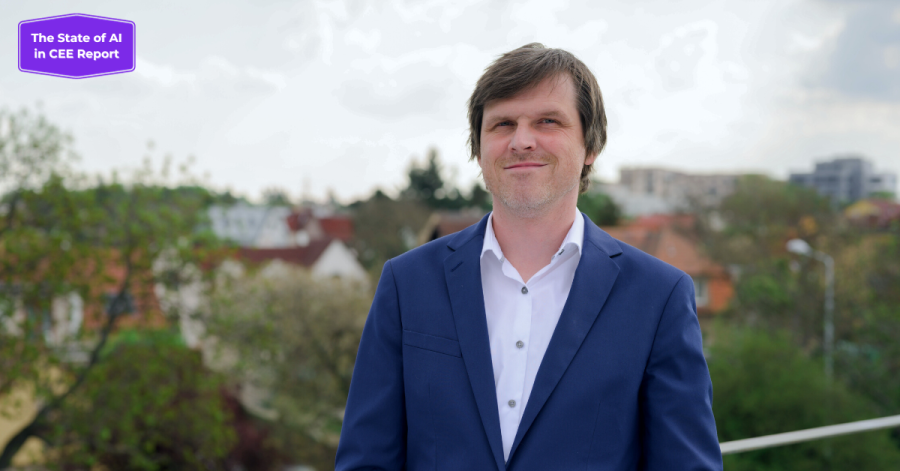In recent years, the AI startup landscape in Central and Eastern Europe has undergone significant changes, shaping the region’s investment environment. To explore the CEE region’s evolving trends, challenges, and opportunities, The Recursive sits down with Martin Dostál, an experienced investor, R&D scientist, and AI/Machine Learning expert.
With a background that traces back to the late nineties during his university studies, Martin plays a pivotal role as an Investment Committee Member at Look AI Ventures fund, the first Czech investment fund exclusively dedicated to early-stage AI startups. Moreover, he serves as a Chief Science Officer and Partner at AI Startup Incubator.
Throughout this interview, Martin sheds light on the transformation of the regional AI ecosystem, the importance of a rigorous evaluation approach, and the impact of regulatory considerations on the investment landscape, among other topics.
The interview was conducted as a part of The Recursive’s “State of AI in CEE” report.
+++ Download the full report with insights from 40+ experts and an analysis of 900 AI product companies from CEE here.
The Recursive: How has AI investment in the Czech Republic and CEE changed, and what key trends do you observe?
Martin Dostál: The number of AI startups is clearly growing, and AI has become mainstream. However, the quality and innovativeness vary vastly across startups. Of course, there is a huge rise in startups applying large language models and generative AI. Czech startups follow CEE trends and stay caught up in technical areas.
On the other hand, I still see that Czech startups are still lagging a bit in business competence and global, or at least regional, ambitions, but at the same time, it is improving. Also, the complexity of AI solutions is growing. Thus, it is really important to carefully evaluate every startup from the perspective of AI technology, its feasibility, and maturity to make good investment decisions.
What factors contribute to the attractiveness of the CEE region as a whole for AI investment?
Martin Dostál: I am convinced that in Czech and more or less in CEE, we also benefit from very good technical education and engineering tradition. Another benefit is the lower cost of development. I have seen around 4,000 AI startups worldwide, and I see CEE companies having the same level of technical quality as US startups, however often with more attractive valuations. In CEE, we also have quite a few spinoffs from universities with superior and unique AI technology and IP. So, I am not concerned about AI technology in CEE.
Areas where CEE needs to improve are entrepreneurship and building business competency, which goes across the whole society, including individual’s mindset, business environment, and education system, to name a few.
What are some of the challenges faced by AI startups seeking funding in the Czech Republic and CEE region?
Martin Dostál: In the current post-covid, high inflation environment, investors are more careful and risk-averse, so it is more difficult to get funding. Moreover, generally speaking, the US venture capital ecosystem is more mature than the Czech one, so the investor playground is smaller.
Furthermore, not every venture capital investor has the expertise and experience to evaluate technologically complex projects with AI, so some really good AI startups are difficult for some investors to understand and value in terms of technology. Our Look AI Ventures fund is purely focused on AI, and we have seen several such examples of quality startups rejected by other investors because of technology depth and complexity. Lastly, it would be beneficial if, in the Czech Republic, the government would focus on improving the entrepreneurship environment for innovative companies to make it simpler, faster, and more predictable.
You have been active in the startup and investment space for over 5 years. Can you share the key aspects or potential you saw in AI that led you to focus on this technology before it became the widespread trend it is today?
Martin Dostál: Let me go deeper into the history. My focus on AI started in the late nineties during my university study when AI was viewed as something like an interesting academic toy by the business. It had many causes, including the so-called AI winters in the past. When the AI Startup Incubator was founded in late 2017, there was already enough computing power and data storage available, and deep machine learning was already on the rise. It was easy to recognize the significant advances and the potential. Many advances in text and image processing were already present at that time.
In the past few years, it matured in capabilities and quality, which exceeded the expectations of many of us.
“However, the potential of AI is far from being exploited, and I expect many breakthroughs in the forthcoming future.”
How do you evaluate the potential of an AI startup? What are the key aspects of the startup’s AI technology that you assess before making an investment decision?
Martin Dostál: At Look AI Ventures, we have our own methodology designed specifically for AI startups that I have developed and validated over the past five years. The AI technology landscape and the very broad area of applications also require a flexible methodology that considers all these specifics when evaluating a startup. And we go in depth. But if I try to generalize, we look at the areas such as technology approach, feasibility, maturity, IP, risks, mitigations, and a few others. We look in detail at the evidence of how the AI is applied and what is the achieved performance.
“With AI startups, there is a higher feasibility risk than with a regular IT startup. So, the ability to qualify technology assessment is a critical skill for successful investing in AI companies.”
Nevertheless, this is just the technology side. Business and team are evaluated as well, which is yet another important step in the process of evaluating an investment opportunity.
Do you offer support to your portfolio startups in implementing AI strategies and developing the technology?
Martin Dostál: Yes, we share our experience and help startups with AI technology advisory and mentorship. I share the expertise I have gained in spending more than 20 years in R&D, including academia and industrial R&D. We have regular technical calls with CTOs or the technical team to discuss the progress, challenges, and possible mitigations. However, as an investor, Chief Science Officer, and AI passionate, you should never forget that you give bits of advice but don’t run the company – that would be counterproductive and can cause problems. It is really exciting to work together on breakthrough AI solutions.
How would you assess the current availability and quality of AI talent in the Czech Republic? What AI roles or skill sets are most in demand among startups?
Martin Dostál: I do not look at the Czech Republic separately from other CEE countries. Also, I roughly estimate that around 50 percent of Czech startups have international teams. Frankly, I do not see a reason to look at the Czech Republic separately. Our laser focus is AI, technical quality, and business viability.
Regarding skill sets, machine learning, especially in the context of large language models and generative AI, is highly demanded now. Not surprisingly, there is a shortage of skilled AI engineers and researchers in the Czech Republic as well as in CEE.
What do you view as some of the obstacles Czech startups encounter when developing AI-powered research, products, and services?
Martin Dostál: Czech startups are facing global, not local only, competition. So, on the technical side, it is important to have a defensible technology. There should be something unique, a method, IP, performance, machine learning models, or data sets to give a few examples. Otherwise, they could be easily disrupted. And finally, let’s not forget about the business side; technology is just one element in the success equation.
When evaluating AI startups for investment, how do you address the ethical considerations related to their technology and practices, ensuring responsible AI development and deployment?
Martin Dostál: I am spending a lot of effort following the latest updates on AI and regulations. It includes the EU AI Act as well as vertical, domain-specific regulations. Interestingly, the AI regulation area is, at least from my experience of communicating with startups, largely underestimated and underskilled by startups. It might cause significant problems later on when AI regulation is put into force, so we take regulatory considerations during the technical evaluation. It is a mandatory component of our technical evaluation.
In the areas where vertical regulation is mandatory, such as healthcare, we carefully evaluate the technology outcomes subject to regulation and roadmaps to achieve regulatory compliance. It is a huge difference if you have a working prototype that does not address the regulatory requirements or a product prototype with some existing regulatory deliverables and a clear roadmap to achieve regulatory compliance.
How are AI regulations impacting the VC industry in the Czech Republic and the CEE region? How do you foresee these regulations influencing investment strategies, startup development, and the AI innovation landscape in the coming years?
Martin Dostál: We need to wait for the final version of the EU AI Act to fully understand all the implications. However, even the current version is quite mature already. I am convinced that reviewing regulatory implications is an important subject of evaluation even now. Achieving regulatory compliance takes time and cost and requires specific skills and experience. The resources needed to achieve regulatory compliance can be, and often are, significant.
When considering an investment opportunity, understanding the regulatory implications is fundamental to correctly assess the project risks.
Do you see any significant collaborations or partnerships among the AI stakeholders in the Czech Republic or CEE region aimed at increasing AI investment opportunities?
Martin Dostál: I would like to point out spinoffs from universities. These companies often have great technology and IP but usually have a low business maturity. And the business maturity might be too low even for early-stage investors. For the success of innovations in the Czech Republic, improving the technology transition and commercialization ecosystem is necessary. Many universities in the US do have dedicated organizational units doing business incubation. We need this as well.
How do you envision the AI landscape in the Czech Republic and CEE region evolving in the next 5-10 years? What potential disruptions or changes do you foresee?
Martin Dostál: As an AI expert, I often get this question. But no one has a magic crystal ball. AI is such a transformative and disruptive technology that making reliable 5-year predictions is practically impossible. However, I can comment on current trends and where I see the potential for breakthroughs in research.
“On the technology side, we can expect further breakthroughs in machine learning, especially in non-supervised learning, and further improvements in generative AI and language models. Language models will soon be supporting more modalities than just text or images. Significant effort is currently put into Trustworthy and Explainable AI, which will be a crucial enabler for high-risk AI systems. I also foresee more focus on technologies for machine reasoning to complement advances in machine learning, which is often used to sense the real environment – we also need to advance the ability of AI to reason about problems.”
Speaking specifically about CEE or the Czech Republic, I think it will be similar to the rest of the world. Yes, there might be implications related to the regulation of AI in the EU. Hopefully, we will be able to establish an AI regulatory framework with little impact on our ability to innovate, as regulation also brings risks in keeping the ability to compete. Looking at the EU AI Act maturity, I would not be surprised if other regions, including the US, take inspiration from the EU, so the regulatory frameworks in other regions might be similar in principle.
How do you expect AI technologies to impact the venture capital industry?
Martin Dostál: AI technologies can help venture capitalists even today. Let me mention a few use cases. First, AI can be used to automate or improve efficiency in scouting startups. Furthermore, AI can collaborate on analyzing investment opportunities by smart searching and collecting data to strengthen data-driven decision-making and efficiently summarize information. There are already valuable datasets in venture capital portals such as Crunchbase, Pitchbook, Traxcn, or CB Insights. AI-driven features are being gradually introduced on these platforms, or they could be potentially used to build custom machine learning models to help with analysis – for instance, for analyzing competition, features, funding, or exit potential. AI can also improve tracking portfolio companies’ progress, including media presence and employee or customer satisfaction.
At Look AI Ventures, I have developed a custom methodology to evaluate AI startups, including some AI techniques to analyze relationships between individual categories and cross-validation of the technical evaluation outcomes. Thus, I am using AI to help us make better decisions and not to replace humans, their skills, and extensive experience in the investment process. As I am still an active R&D person, I have a vision to significantly enhance the use of AI methods in my technology evaluation tasks.







